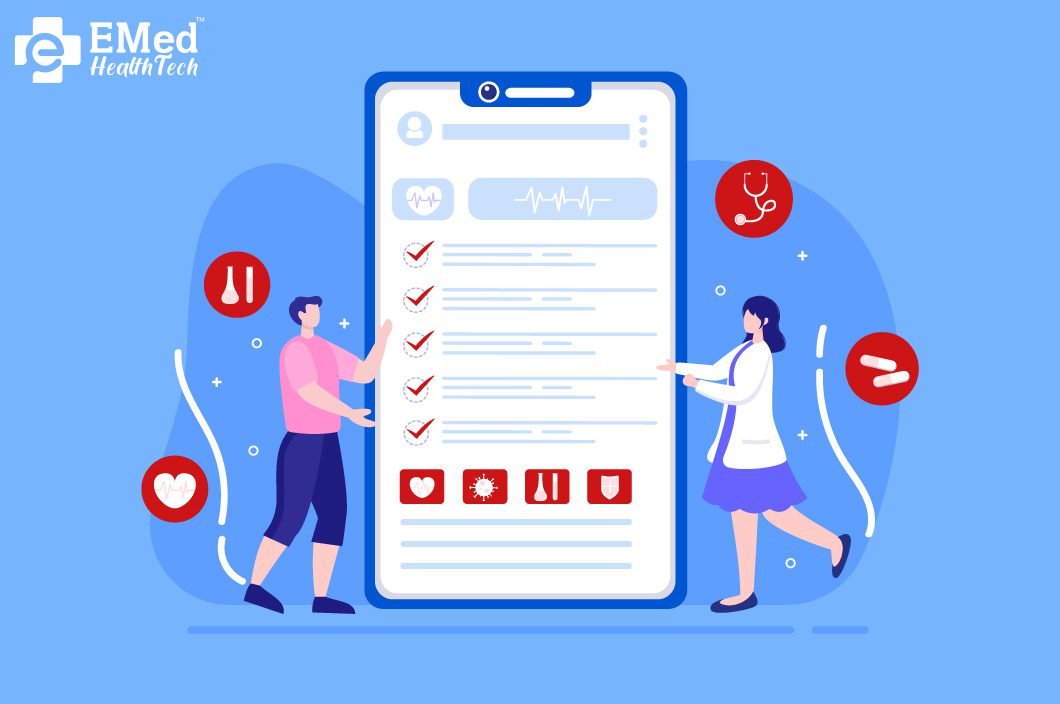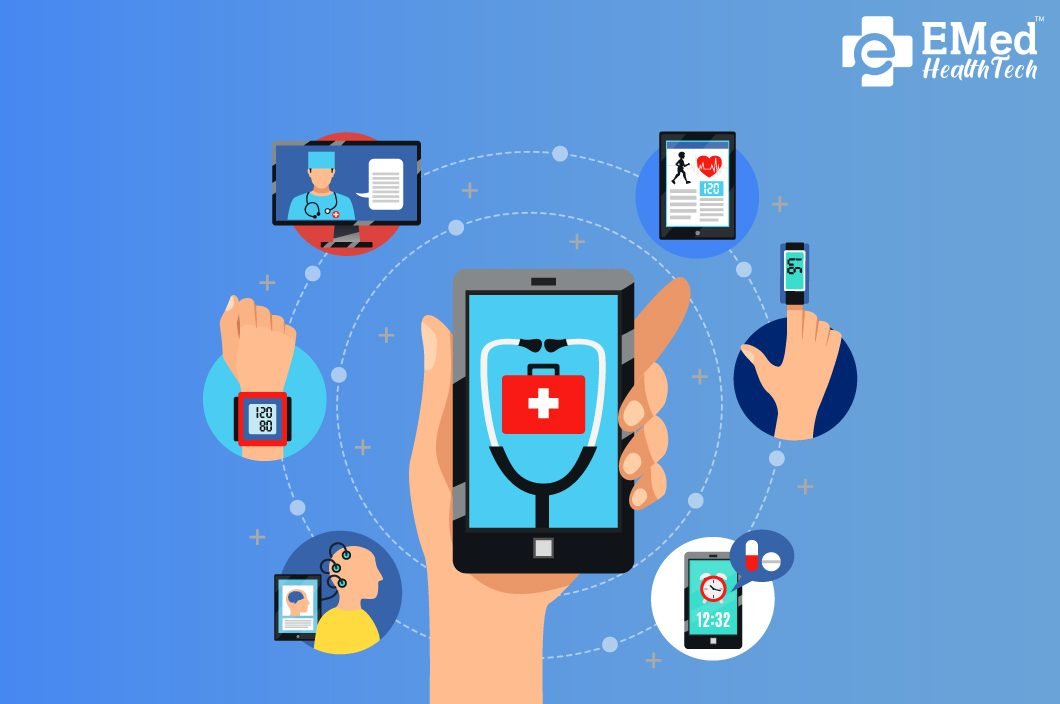Time has flown from the advent of modern medicine to where we are now. Technology has grown exponentially from one to the next, and with it, the way we interact with medical healthcare services. Telehealth services like healthcare apps have changed the face of healthcare services. This article takes an in-depth look at custom healthcare app development.
What are Healthcare Apps?
Healthcare apps are designed to make the interactions between medical professionals and people convenient and effective. These apps have different functions. Some apps facilitate consulting a doctor for illnesses, while some enable an online pharmacy. Other apps create a holistic approach to managing a patient’s health by integrating different factors. They also provide remote access to patients to enable monitoring them, thus making it easier to manage resources and provide the best for the patient. All of these apps are useful for the patient as well as the doctor in many ways and are actively recommended to all healthcare facilities, owing to the enormous benefits they offer.
Why It’s Essential for Healthcare Providers to Build a Medical App in 2023
Healthcare providers seek a good custom healthcare app development company to create a custom-made app that fits their requirements. This is mainly because recent times have proven significant benefits in choosing a virtual healthcare service over an in-person one. The COVID pandemic, in April 2020, showed a tremendous increase in the use of telemedicine services, which was up to 38 times higher than previous records. The general public is more aware of a healthcare app’s benefits and would choose it if the healthcare provider offered it. Here are some benefits a patient would have from a healthcare app.
The general public is more aware of a healthcare app’s benefits and would choose it if the healthcare provider offered it. Here are some benefits a patient would have from a healthcare app.
– Save Money on travel expenses.
– Lower exposure to pathogens due to social distancing.
– Higher rates of keeping appointments.
– Easier access to specialized healthcare.
– Beat social stigma associated with certain illnesses.
– Better health management with regular follow-ups virtually.
When it comes to a doctor and healthcare facilities, they have benefits like:
– Better management of time and appointment schedules.
– Better health records management.
– Better work-life balance with more work done in less time.
– Track patient health and identify effective treatment methods.
Types of Medical and Healthcare Apps
Healthcare and medical apps are umbrella terms for the different kinds of ways in which technology enables better interactions between a patient and a healthcare facility. It may be through video conferencing to provide consultation and e-prescriptions, through home delivery of medicines, tracking vitals through wearable technology, etc. Here are some of the common types of healthcare and medical apps.
1. Telemedicine App: Apps that facilitate booking an appointment with doctors and use video conferencing or audio to talk to the doctor as opposed to the traditional in-person doctor visit. Also, read 10 Benefits of Telemedicine Apps in Virtual Healthcare.
2. Online pharmacy: This app allows users to browse the medicine they require using an e-prescription, buy them online through safe payment portals and get them delivered to their homes.
3. Integrated Healthcare Platform: This brings together three vital healthcare services, telemedicine, online pharmacy, and lab services. All of these can be accessed from a single platform.
4. Patient Engagement: These are apps designed to bring doctors and patients to a platform where the doctor can engage the patient with information on all aspects of their health.
5. Remote Patient Monitoring: With the advent of IoT-based smart wearables that track a person’s vitals, healthcare providers can keep track of the patient’s health in real-time.
6. Chronic Disease Management: Diseases like diabetes, obesity, and heart diseases, which can only be managed and not cured, can be better managed with apps that facilitate better interactions.
The Best Features of Healthcare Apps
Here are some features one needs to include in a well-built healthcare app.
– Simplified Registration: An easy-to-navigate registration process is the most important to get the patient on board.
– ChatBots: Chatbots are an AI-powered feature that can help users get where they want with simple instructions, clear doubts, and get follow-up tips, etc.
– Physician Search: Functions that help patients decide which doctor they should consult based on their symptoms greatly help patients.
– Appointment Scheduling: This Feature should help the patient as well as the clinic manage appointments and schedule them to everyone’s convenience.
– Appointment Reminders: Patients may not always remember appointments, especially older patients. This feature can help them keep appointments efficiently.
– Video-conferencing feature: A video-conferencing feature allows the doctor to meet the patient virtually. With the best technology, this feature can be made smooth.
– E-prescriptions: These are electronically made prescriptions that can be shared with online pharmacies. It also prevents the misreading of hand-written prescriptions.
– Medication Reminder: Patients may also forget to eat their medicines on time, making the treatment ineffective.
– Safe Payment Portals: Ideally, a healthcare app requires strong safety features and payment features that are well-guarded to protect the patient’s details.
– Data Privacy: Many patients’ details are shared on healthcare apps, including their banking details. Without good security, patients may not trust the app.
Top Advantages of Custom Healthcare Apps Over Pre-Built Apps

It goes without saying that a custom healthcare app is always better than off-the-shelf pre-built apps. Here you can find more about what is difference between custom healthcare software and ready-made healthcare software. Here are some of the advantages of custom healthcare apps:
– Customization: When custom-making for your healthcare facility, you can customize it to meet your particular needs.
– Autonomy: You can have better autonomy over the custom-made app than a premade app.
Compatibility: You can change the features to suit your particular needs and make them compatible with the services you offer.
– Scalability: With custom-made apps, you can scale up and down according to your growth.
– The advantage over the competition: The app can be made to give you high customization and deliver better results, giving you an advantage over competitors.
– Affordable: Custom-made apps mean you pay only for what you need compared to pre-made apps. You can increase the app modules when needed and only pay then.
– Safety: The app has better safety than pre-made ones. It keeps all your patient data safe, giving you better trust from your customers.
– Compliance: Every medical healthcare app has to abide by certain rules and regulations. With custom healthcare apps, you can ensure you follow each of them according to the services you subscribe to. Here is the list of key regulatory compliance standards healthcare software developers know.
Why Choose EMed HealthTech as Your Custom Healthcare App Development Partner?
The healthcare industry has traveled far from its humble origins and is advancing tremendously. There is not a stone unturned in its path when it comes to integrating technology. When the best of technology comes together with the best of healthcare services, magic happens.
Custom healthcare app development has become a necessity for healthcare services today. There is no longer time to consider whether or not they need it. It has become an integral part of healthcare and is also preferred by patients. Hospitals, clinics, and even private practices refer to include technology in some way to make their services better.
When choosing a custom healthcare app development company, you should consider how their expertise aligns with your needs. Not all companies are involved in a broad spectrum of custom healthcare app development.
EMed HealthTech is a custom healthcare software development company engaged in stellar app development with a highly acclaimed list of satisfied clients. At EMed HealthTech, we provide the best healthcare IT solutions to match your specific needs, help you improve the quality of healthcare services, and increase revenue. To know more about Healthcare apps, Schedule a Call Now.
Frequently Asked Questions
1. What are healthcare apps?
Healthcare applications are apps that are specialized in providing virtual access to the various healthcare services provided by a healthcare center.
2. How to build a healthcare app?
A healthcare application is best custom-made to suit the healthcare facility’s needs. A team of app development experts like EMed HealthTech will often provide the most suitable and cost-effective way to achieve this.
3. Why are healthcare apps important?
Healthcare apps are important because they provide the necessary technological intervention of the time. It allows people to access these services easily.
4. How much does custom healthcare app development cost?
The cost depends upon the kinds of features you want to include. A custom healthcare app is always affordable and can stay within budgets.











